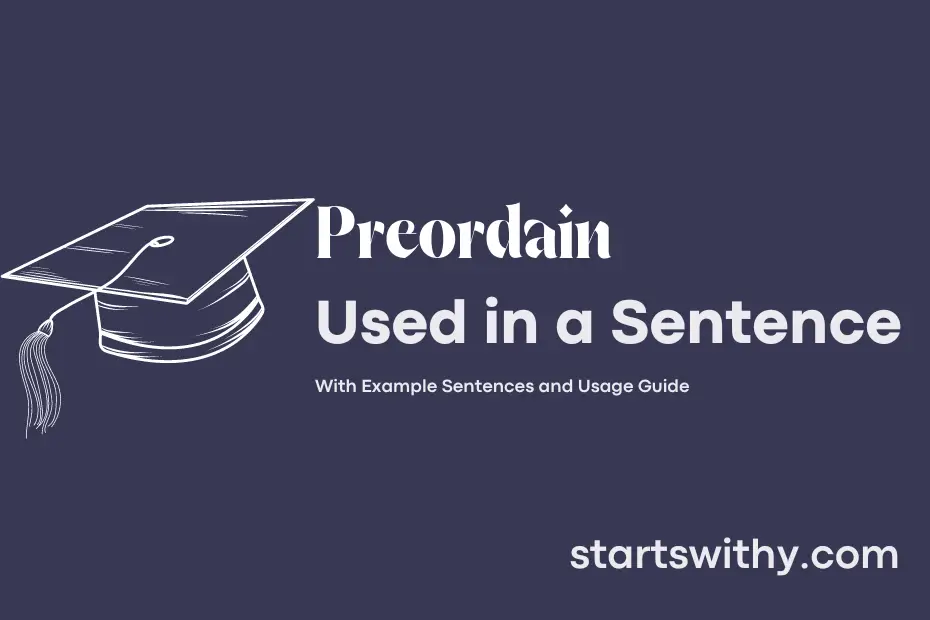Do you believe in fate or destiny? The word “preordain” refers to the concept of something being predetermined or decided beforehand. It implies a sense of inevitability or a higher power guiding events in a particular direction.
In various religious and philosophical beliefs, the idea of preordination plays a crucial role in shaping the course of individuals’ lives and the universe as a whole. This concept suggests that certain events are predetermined and cannot be changed, leading to discussions about free will, choice, and the nature of existence.
7 Examples Of Preordain Used In a Sentence For Kids
- Preordain means something that is meant to happen.
- Some people believe that events are preordained before they happen.
- The fortune teller claimed that my future was preordained.
- The ancient texts mention a preordained destiny for each person.
- The seer predicted that the outcome was preordained.
- It is said that our fates are preordained by a higher power.
- The wise owl whispered that everything in life is preordained.
14 Sentences with Preordain Examples
- Make sure to study hard for your exams, as it is believed that success is preordained for those who put in the effort.
- Some students may feel pressure to pursue careers that society deems as preordained for their background or family’s profession.
- It is common for college students to question whether their academic path is truly preordained or if they have the freedom to choose their own destiny.
- Despite feeling overwhelmed at times, many young adults find comfort in the idea that their future success is preordained and they just need to work towards it.
- As final year students prepare to enter the workforce, they may wonder if their dream job is preordained or if they have to actively seek out opportunities.
- The pressure to excel in academics can sometimes overshadow the idea that each individual’s journey is preordained and unique.
- It is important for college students to remember that their success is not preordained, and that hard work and determination play a key role in achieving their goals.
- When faced with challenges, students often seek solace in the belief that their hardships are preordained and necessary for personal growth.
- Many college students struggle with the notion of whether their relationships are preordained or if they have the power to shape their own love lives.
- It is common for young adults to grapple with the concept of destiny and whether their future is preordained or if they have the ability to change their paths.
- While it may feel like their academic success is preordained, students must remember that they have the power to shape their own futures through hard work and perseverance.
- The pressure to choose a career path can lead students to question if their calling is preordained or if they have the freedom to pursue their passions.
- College students often seek guidance from mentors and elders to understand if their struggles are preordained or if they can take control of their own destinies.
- As students navigate the complexities of adulthood, they may find peace in the idea that their purpose is preordained and they are on the right path to fulfillment.
How To Use Preordain in Sentences?
Preordain is a versatile verb that is frequently used in written and spoken English. When using Preordain in a sentence, make sure to place it before the action or event that was predetermined or decided in advance.
For example:
– “The prophecy seemed to preordain the rise of a new leader.”
– “The stars appeared to preordain their fateful meeting.”
– “The ancient tablet seemed to preordain the location of the hidden treasure.”
To use Preordain effectively, consider the context in which it is being used. This will help ensure that the sentence conveys the intended meaning clearly. Remember that Preordain implies a sense of inevitability or destiny, so choose your words carefully to capture this nuance.
In conversations or formal writing, using Preordain can add depth and sophistication to your language. It can help convey a sense of foreknowledge or divine planning, depending on the context. Practice using Preordain in different sentences to become more comfortable with incorporating it into your vocabulary.
Overall, using Preordain adds a touch of elegance and precision to your language. With practice and attention to context, you can effectively incorporate Preordain into your writing and speech to enhance your communication skills.
Conclusion
In conclusion, preordain refers to the act of determining or deciding something in advance. This concept can be seen in various contexts, such as religion, fate, or even in a legal sense. Sentences using the word preordain illustrate the idea of something being destined or predestined to happen before it actually does. For example, “Many believe that our paths are preordained and that our actions are already predetermined.” This highlights the notion of a predetermined outcome that cannot be changed.
Overall, the use of sentences with preordain emphasizes the idea of fate or destiny playing a role in events. It suggests that certain outcomes or decisions are already planned or fixed, highlighting a sense of inevitability or predetermined course of action.



